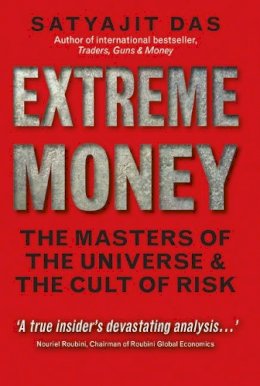Satyajit Das is an internationally respected expert in finance with 33 years’ experience. He has worked for the “sell side” (Citicorp Investment Bank and Merrill Lynch), the “buy side” (as Treasurer of the TNT Group), and as a consultant advising banks, investors, corporations, and central banks worldwide. Das is the author of many highly regarded standard reference books on derivatives and risk management. In 2006, he published the international bestseller Traders, Guns & Money, an extraordinary insider’s account of the world of derivatives trading. In Traders and in a series of speeches in 2006 entitled - The Coming Credit Crash, Das anticipated many of the problems that became apparent in the financial crisis and are still affecting the global economy. He was recently featured in Charles Ferguson’s 2010 Oscar®-winning documentary Inside Job and the 2009 BBC documentary Tricks with Risk.
Long listed for Financial Times/ Goldman Sachs Business Book of the Year 2011 Listed in Bloomberg’s Top Business Books of the Year 2011 One of ninemsn.com.au’s best business books of 2011 "…a powerful book…highly readable and informative…Anyone who decodes the ratings of the three major agencies so amusingly – CCC means "Russian roulette with five bullets in the chamber" and D means "scrape your brains off the wall and place in a plastic bag"- demands to be read." Lindsay Tanner, former Australian Minister of Finance inThe Monthly, August 2011 " While the run-up to the global financial crisis has been well documented, Das provides his own unique insights." Luke Faulkner, Hedge Funds Review, August 2011 "...virtually in a category of its own – part history, part book of financial quotations, part cautionary tale, part textbook. It contains some of the clearest charts about risk transfer you will find anywhere. ...Others have laid out the dire consequences of financialisation ("the conversion of everything into monetary form", in Das’s phrase), but few have done it with a wider or more entertaining range of references...[Extreme Money] does... reach an important, if worrying, conclusion: financialisation may be too deep-rooted to be torn out. As Das puts it – characteristically borrowing a line from a movie, Inception – "the hardest virus to kill is an idea". Andrew Hill "Eclectic Guide to the Excesses of the Crisis" Financial Times, 17 August 2011 “an idiosyncratic yet withering analysis of how 30 years of financial alchemy and excessive credit have plunged us into what feels like a slow-motion depression… addresses, one by one, the overarching themes of the great credit boom and bust of the late 20th century. Black humor is Das’ natural medium, and he gave me a rueful chuckle every few pages. You know that a writer is hard to pigeonhole when the advance praise compares him to both Candide and Hunter S. Thompson. I prefer to view Das as a modern-day Ishmael with an attitude, a weathered seaman who has witnessed firsthand the crazed hunt of hedge-fund captains for alpha, the great whale of superior investment returns. … I could only endorse the conclusion. “There is no simple, painless solution” to the fix we’re in, Das writes. “The world has to reduce debt, shrink the financial part of the economy, and change the destructive incentive structures in finance. Individuals in developed countries have to save more and spend less.” Doomsday Debt Machine Roars as Wizard Das Chides Buffett: Books, By James Pressley, Sep 19 2011 “ a fast paced ride...Das manages to be both an insider and outsider – much of what he covers is based on first hand experience...there’s no of the faux glamour that infuses many otherwise critical books on finance.... this is a thoughtful, interesting and unusual book that deserves to jostle for shelf space alongside classics such as Charles Kindleberger’s Manias, Panics and Crashes and Devil Take The Hindmost by Edward Chancellor. It is well worth a read by anyone seeking to grasp the broader impact of the recent crisis." Chris Sholto Heaton, Money Week, November 2011 “...Mr Das has a keen eye for an anecdote .... give[s] the reader plenty of chances to chuckle at the hubris he reveals.. the views of people like Mr Das were consistently ignored in the run-up to the debt crisis..” More luck than judgment,

